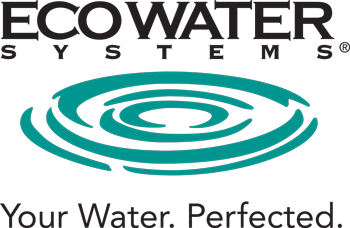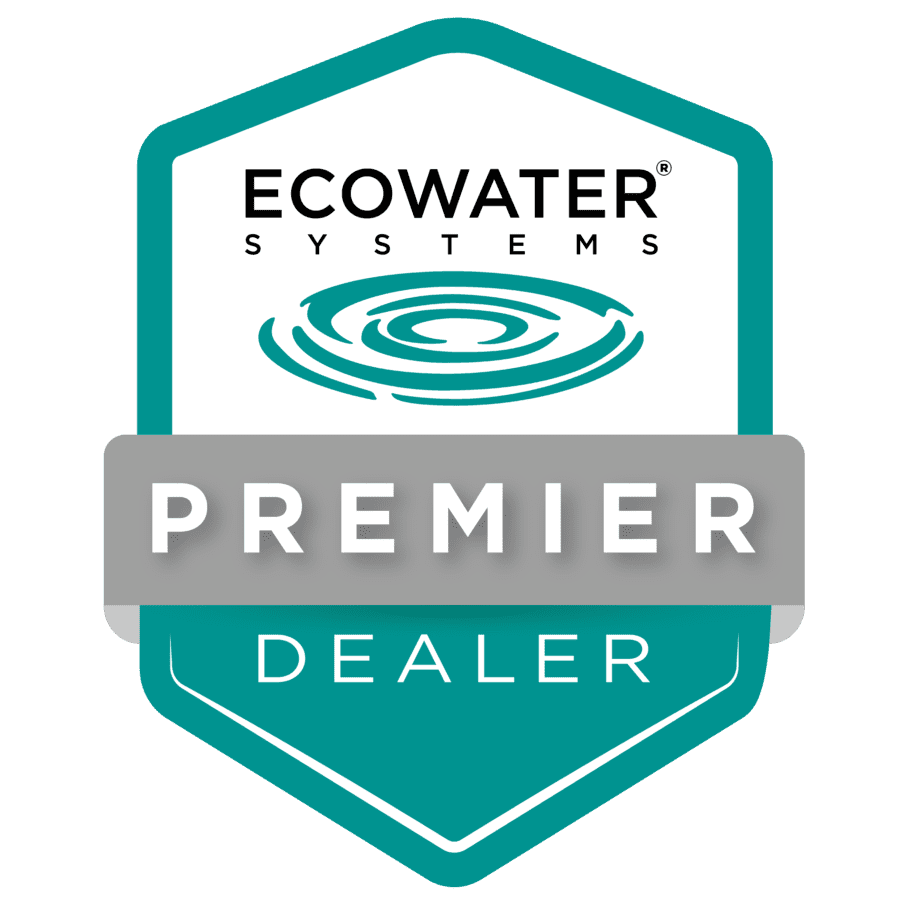FAQs
Water Softener FAQs
What is soft water?
To understand soft water, we need to know what makes water hard. Hard water is water that has a high mineral content. It’s a natural result of minerals like calcium and magnesium accumulating during the water cycle, and it can happen with well water and even city water. The more calcium and magnesium dissolved in the water, the harder the water becomes. This is why certain cities and counties within the same state can have varying degrees of water hardness.
A water softener system treats your water at the point it enters the home. Having soft water means removing these hardness impurities before the water travels through your pipes and into your water-using appliances, and before you draw water from the taps of your bathrooms and kitchen. Soft water is less than 1 gpg, whereas hard water is anything above 7gpg. Over 85% of households live in hard water areas.
Why does soft water make my skin feel slippery?
An EcoWater water softener system removes the impurities in your water so your skin is rinsed without hard water minerals left behind. There is no residue on your skin to trap traces of soap, dead skin cells and other particles. And no residue left behind that dries your skin. The slippery, softness you feel is exactly how clean skin is supposed to feel.
The same way that soft water eliminates water spots that dry onto your glassware and silverware, it allows your bath soaps to lather better and rinse off completely. Soaps will lather better and you’ll be able to use half as much.
I live in the city. Since they treat the water, does that mean my water is already soft?
Most municipalities treat water by using chlorine to kill bacteria. Some might even soften the water, but only to meet minimum requirements. That doesn’t mean it is ideal for your family.
An EcoWater Systems water refiner softens your family’s water by removing the hardness minerals and sediments that weren’t removed by the municipality, and it also removes the chlorine taste and odor.
How can I treat my well water?
We will evaluate your water and recommend a water softener system or whole home filtration systems customized to treat your home’s water. The benefits include:
- Reduced scale build-up on pipes, faucets and water-using appliances, providing energy savings.
- Reduced iron stains, tastes and odors.
- Cleaner, brighter laundry.
- Lower use of soaps and detergents, saving money.
- Eliminated spots on glassware and silverware.
- Softer skin and hair.
How do I determine the right softener for my home?
The right product for your home is determined by testing your water, considering how many people are living in your home, understanding your normal water usage, taking into account the number of bathrooms you have, understanding the water-using appliances in your home, etc. Our team of water treatment professionals is trained to understand your family’s needs and determine the right product for your home.
How does a water softener operate?
One of the biggest misconceptions about water softeners is that the salt is what softens your water. What actually softens the water are the thousands of resin beads inside your softener that filter out hard water minerals.
Water softeners use a negatively charged ion exchange resin to collect the impurities from your water. The resin becomes charged when it mixes with a sodium or potassium solution. The salt in the water softener isn’t what softens the water; it is what enables the resin to collect and remove the hardness from your water.
The EcoWater refiner softens your water, and also removes the chlorine taste and odor, which is often a result of water treated by cities and municipalities. Regeneration is a term used for when the resin is being cleaned and recharged in the sodium solution.
My softener isn’t using much salt.
Why is there water in my salt tank?
It is normal to have water in the bottom of your salt tank. If there is more than five inches, or if you suspect a leak, contact your EcoWater Pro, who will assess the situation.
My water feels too soft. Can I adjust it?
No. Soft water is soft water. You cannot adjust the level of impurities being removed from the water.
Efficiently Run Softeners Do Not Hurt Septic Tank
A study released at WQA Aquatech USA indicates “that the use of efficiently operated water softeners improves septic tank performance, while the use of very inefficiently operated water softeners may have a negative effect on solids discharge to the drain field and the level of impact will depend on the level of hardness in the water, whether the regeneration waste is discharged to the septic tank, and the amount of excess sodium present in regeneration waste.”
The Water Quality research Foundation commissioned Virginia Polytechnic Institute and State University to conduct this independent study in 2012 which resulted in an official report, “Changes in Septic Tank Effluent Due to Water Softener Use.” Two different approaches were taken to conduct this study; one in a laboratory setting and the other looked at case studies conducted in the field.
Local Info
FAQs
Water Softener FAQs
What is soft water?
To understand soft water, we need to know what makes water hard. Hard water is water that has a high mineral content. It’s a natural result of minerals like calcium and magnesium accumulating during the water cycle, and it can happen with well water and even city water. The more calcium and magnesium dissolved in the water, the harder the water becomes. This is why certain cities and counties within the same state can have varying degrees of water hardness.
A water softener system treats your water at the point it enters the home. Having soft water means removing these hardness impurities before the water travels through your pipes and into your water-using appliances, and before you draw water from the taps of your bathrooms and kitchen. Soft water is less than 1 gpg, whereas hard water is anything above 7gpg. Over 85% of households live in hard water areas.
Why does soft water make my skin feel slippery?
An EcoWater water softener system removes the impurities in your water so your skin is rinsed without hard water minerals left behind. There is no residue on your skin to trap traces of soap, dead skin cells and other particles. And no residue left behind that dries your skin. The slippery, softness you feel is exactly how clean skin is supposed to feel.
The same way that soft water eliminates water spots that dry onto your glassware and silverware, it allows your bath soaps to lather better and rinse off completely. Soaps will lather better and you’ll be able to use half as much.
I live in the city. Since they treat the water, does that mean my water is already soft?
Most municipalities treat water by using chlorine to kill bacteria. Some might even soften the water, but only to meet minimum requirements. That doesn’t mean it is ideal for your family.
An EcoWater Systems water refiner softens your family’s water by removing the hardness minerals and sediments that weren’t removed by the municipality, and it also removes the chlorine taste and odor.
How can I treat my well water?
We will evaluate your water and recommend a water softener system or whole home filtration systems customized to treat your home’s water. The benefits include:
- Reduced scale build-up on pipes, faucets and water-using appliances, providing energy savings.
- Reduced iron stains, tastes and odors.
- Cleaner, brighter laundry.
- Lower use of soaps and detergents, saving money.
- Eliminated spots on glassware and silverware.
- Softer skin and hair.
How do I determine the right softener for my home?
The right product for your home is determined by testing your water, considering how many people are living in your home, understanding your normal water usage, taking into account the number of bathrooms you have, understanding the water-using appliances in your home, etc. Our team of water treatment professionals is trained to understand your family’s needs and determine the right product for your home.
How does a water softener operate?
One of the biggest misconceptions about water softeners is that the salt is what softens your water. What actually softens the water are the thousands of resin beads inside your softener that filter out hard water minerals.
Water softeners use a negatively charged ion exchange resin to collect the impurities from your water. The resin becomes charged when it mixes with a sodium or potassium solution. The salt in the water softener isn’t what softens the water; it is what enables the resin to collect and remove the hardness from your water.
The EcoWater refiner softens your water, and also removes the chlorine taste and odor, which is often a result of water treated by cities and municipalities. Regeneration is a term used for when the resin is being cleaned and recharged in the sodium solution.
My softener isn’t using much salt.
An EcoWater softener or refiner is very efficient, so you might not go through as much salt as another brand used. If you feel like your water isn’t soft, and the level of salt is not decreasing at all, consult your EcoWater Pro.
Why is there water in my salt tank?
It is normal to have water in the bottom of your salt tank. If there is more than five inches, or if you suspect a leak, contact your EcoWater Pro, who will assess the situation.
My water feels too soft. Can I adjust it?
No. Soft water is soft water. You cannot adjust the level of impurities being removed from the water.
Efficiently Run Softeners Do Not Hurt Septic Tank
A study released at WQA Aquatech USA indicates “that the use of efficiently operated water softeners improves septic tank performance, while the use of very inefficiently operated water softeners may have a negative effect on solids discharge to the drain field and the level of impact will depend on the level of hardness in the water, whether the regeneration waste is discharged to the septic tank, and the amount of excess sodium present in regeneration waste.”
The Water Quality research Foundation commissioned Virginia Polytechnic Institute and State University to conduct this independent study in 2012 which resulted in an official report, “Changes in Septic Tank Effluent Due to Water Softener Use.” Two different approaches were taken to conduct this study; one in a laboratory setting and the other looked at case studies conducted in the field.

